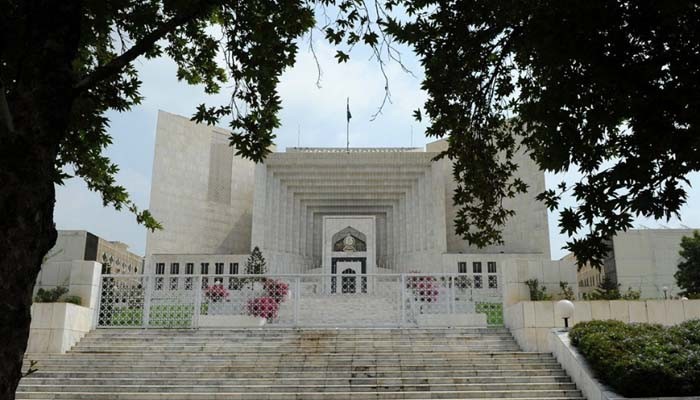Faizabad sit-in case: SC interim order states TLP registered by UAE resident
November 20, 2018
ISLAMABAD: The Supreme Court on Tuesday issued an interim order on a suo motu case on the sit-in staged by the Tehreek-e-Labbaik Pakistan (TLP) at Faizabad Interchange in 2017 and stated the party was registered with the Election Commission of Pakistan (ECP) by a resident of the United Arab Emirates (UAE).
A two-judge bench headed by Justice Mushir Alam and comprising Justice Qazi Faez Isa resumed hearing the suo motu case on November 16 and had expressed anger over the absence of the attorney general of Pakistan and questioned the government's seriousness.
Last year in November, the top court had taken suo motu notice of the sit-in staged by TLP leaders and activists at the Faizabad Interchange. The three-week long sit-in, which had paralysed the federal capital, was called off on November 27 after protesters reached an agreement with the government.
The five-page order issued today stated that the Election Commission of Pakistan (ECP) submitted a report on the record of TLP's registration as a political party.
“The report is signed by the secretary, who we are told, has taken a one-day holiday for an undisclosed personal reason on the very day this case was fixed, which creates the impression that this hearing is being avoided,” it added.
“The report states that those who had resorted to the dharna at the Islamabad Faizabad Interchange was registered as a political party. We would want to hear the ECP and the learned AGP on the question whether a party that brought the country to a standstill, caused massive economic loss, the loss of life, injured law enforcement personnel and cause destruction of public and private property can be registered as a political party or be allowed to continue as such,” the order stated.
Further, it said that the report present by ECP reveals that the TLP was registered by “a person who held a National Identity Card for Overseas Pakistanis (NICOP) which showed his residence to be in the United Arab Emirates (UAE)”.
The order upheld that the ECP director general (law) cannot answer whether the said person possesses a Pakistani passport or is a dual national or a foreign national, “and instead states that a political party can also be registered by those having NICOPs, but without referring to any provision of law”.
Further, it stated that the TLP did not submit “particulars of expenses incurred by it which it is required to submit”.
The ECP DG stated that the referred to legal provisions are “cosmetic in nature”, it added. “We are amazed that a senior employees of the ECP, that is the director general (law), ECP, is himself undermining the Elections Act and the Elections Rules,” the order asserted.
Stating that the ECP DG’s statement causes “grave concern”, the order said, “Needless to state, the creditability of the ECP is tarnished and undermined when its own senior officer states that its law is cosmetic.”
“ECP is therefore directed to submit in writing whether it proscribes to the views of Mr Muhammad Arshad, its director general (law) and if not then what action it proposes to take against the political party,” the order read.
The secretary of the ECP is directed to be in attendance on the next date of hearing, it added.
Further, the order stated, “We expect the learned AGP to come prepared to attend to the matters noted herein as well those in earlier orders. We also need to determine the parameters of protests and how these have to be handed by the state. In this regard whether there are parallels with earlier protests and how those were handles, including those of May 12, 2007 in Karachi and the Pakistan Tehreek-e-Insaf (PTI) and Pakistan Awami Tehreek )PAT) dharna at D-Chowk, Islamabad.”
Hearing the suo motu case on November 16, the two-judge bench had directed the attorney general and information secretary to appear at the next hearing on November 22.













